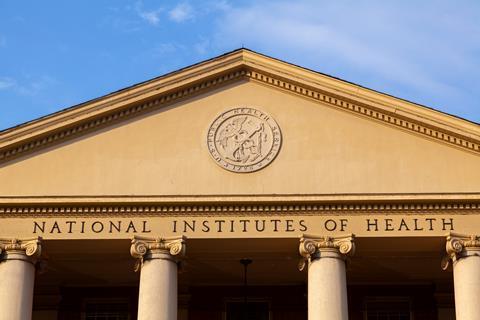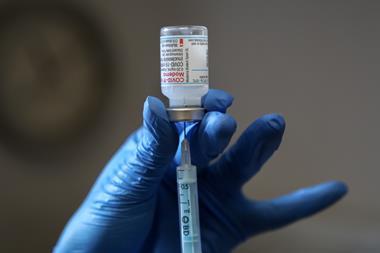Researchers are increasingly concerned about the future of messenger RNA (mRNA) vaccine research in the US. Initial worries were sparked by a US National Institutes of Health (NIH) review of the studies it funds in this area, while staff cuts at agencies that support this type of research have added to scientists’ fears.
‘Despite the promise of this technology … we are risking squandering our leadership in the mRNA space in the 21st century,’ Jeff Coller, an expert on RNA biology from Johns Hopkins University (JHU) in Maryland, warned at a media briefing about the potential of mRNA medicines on 10 April.
‘NIH [funded] researchers across the US are being targeted for projects involving mRNA vaccines,’ he stated. ‘Based on what we have seen in other research areas, the next steps could be for the administration to halt funding for projects that are developing these breakthrough mRNA therapeutics.’
Coller also highlighted ‘the huge cuts in experienced staff’ at the US Food and Drug Administration, and in particular the resignation of Peter Marks, the long-time director of the agency’s unit that regulates vaccines and other biological products. Such departures raise significant questions about whether the US will maintain its leadership within this sector, he suggested.
mRNA projects lose budgets, partnerships and jobs
According to Coller, there are currently over 700 potential medicines based on mRNA at the preclinical development stage across academia and industry, and 267 in clinical development. Most of this activity is housed at companies located within the US, with around 65% of the 150,000 people working globally on mRNA research based in the country.
But Coller warned that ‘skittishness’ across the industry could see projects moved overseas, due to companies’ concerns about the situation in the US.
Surveys of 100 senior life science professionals in the field, conducted in late March by the Alliance for mRNA Medicines that Coller helped found, indicated that about 30% would consider relocating their operations overseas if the US pulled away from investment in mRNA technology.
According to Coller, almost half of those surveyed reported already experiencing negative effects from policies enacted under President Donald Trump’s second administration. These impacts include the reduction in the scope of projects, budget reductions, delayed capital investments, partnership terminations, job losses and hiring freezes, and relocation of projects or divisions at their companies to other shores, Coller said.
‘Indeed, in conversations with our members, strategic partnerships have been lost because NIH funding has been cut, and companies are already looking overseas to turn their manufacturing operations into other countries,’ he stated.
Amid ‘the threat of indiscriminate cuts’ to mRNA programmes in the US, Coller noted that governments in China, the EU, Australia and Brazil appear to be doubling down on their investments in this technology.

Meanwhile the deputy director of JHU’s comprehensive cancer centre Elizabeth Jaffee, an oncologist focused on immune-based therapies for pancreatic and breast cancers, is worried that her NIH grant that funds research on an mRNA-based pancreatic cancer vaccine could be stopped, along with the ongoing associated clinical trial.
‘We are very concerned, and our patients are concerned,’ Jaffee stated at the JHU briefing. ‘We don’t have a lot of funding for doing these trials beyond the NIH, and the way things are going … you are told a day in advance that your grant is cut.’
In the meantime, Coller said that Republican lawmakers in at least seven states have introduced state measures to ban or restrict the usage of mRNA in treating various health disorders.
In response to questions Chemistry World raised about researchers’ concerns over grant terminations and delays, and the threat of mRNA medical research projects moving overseas, an NIH spokesperson said: ‘NIH is taking action to terminate research funding that is not aligned with NIH and HHS priorities. We remain dedicated to restoring our agency to its tradition of upholding gold-standard, evidence-based science.’
‘As we begin to make America healthy again, it’s important to prioritise research that directly affects the health of Americans. We will leave no stone unturned in identifying the root causes of the chronic disease epidemic as part of our mission to make America healthy again,’ they added.

















No comments yet